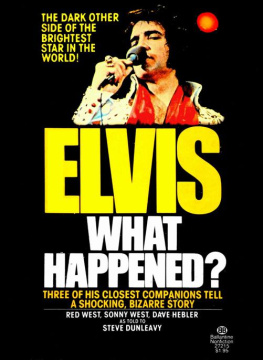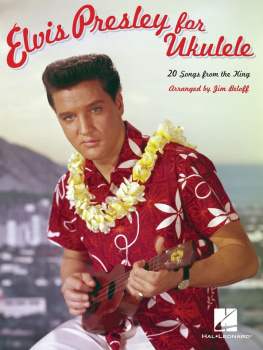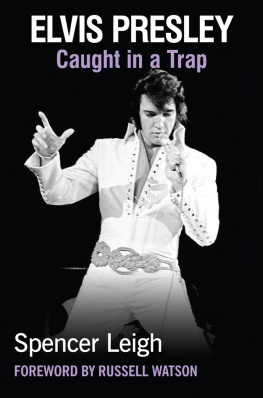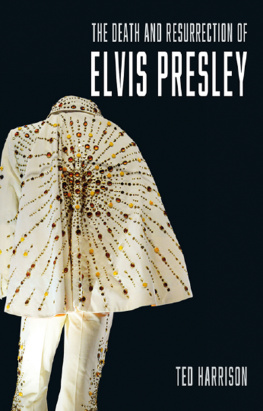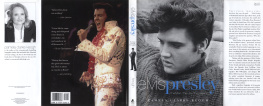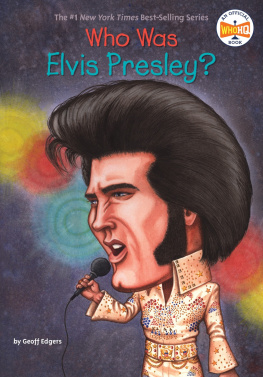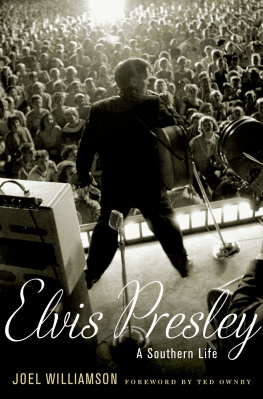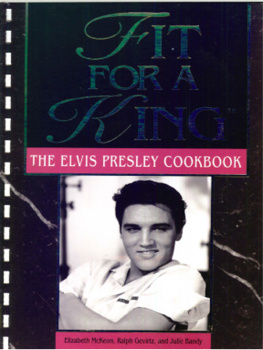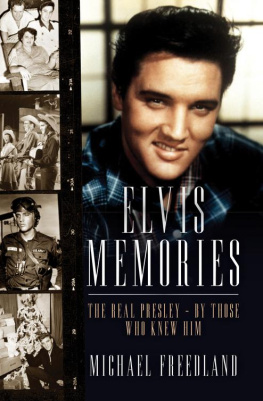PUBLISHERS NOTE
The original publication date of this book was August 1, 1977 fifteen days prior to the unfortunate and untimely death of Elvis Presley. ELVIS: WHAT HAPPENED? is based on reminiscences of three longtime friends and bodyguards of Presley as told to journalist Steve Dunleavy.
This book was to be, in their minds, a desperate effort to communicate to Elvis one last time: He will read and he will get hopping mad at us because he will know that every word is the truth, said Sonny West but maybe, just maybe, it will do some good.
It is too late for Elvis, but perhaps not too late for those who believe that every life contains a painful but instructive truth worthy of recording and understanding.
Copyright 1977 by World News Corporation
All rights reserved under International and Pan-American Copyright Conventions. Published in the United States by Ballantine Books, a division of Random House, Inc., New York, and simultaneously in Canada by Ballantine Books of Canada, Ltd., Toronto, Canada.
Library of Congress Catalog Card Number: 77-6127
ISBN 0-345-27215-3
Manufactured in the United States of America
First Edition: August 1977
2
H umes High School was one of those drab, three-story relics of the Souths nineteenth-century past. A dull, brown brick building, it stood forbiddingly on Manasas Street, Memphis, Tennessee, a monument to all that was strict, Southern and no nonsense. The only good thing about Humes High School on that hot, summer day in 1952 was that the 3:15 P.M. bell had rung, and the kids were pouring out of classrooms like frothy beer from a bottle.
Sixteen-year-old Red West, having been bent into a classroom desk all day, suddenly got a little spring into his lanky gait as he headed for one of the really important things in lifefootball practice. To Red, school hours spent in the classroom were just pesky interruption to his teenage life of raising hell or playing football or baseball. Red, naturally enough, got his name from a defiant thatch of carrot-colored hair, which he wore in the fashionable crew cut of the era. When time or money was short, the crew cut would often grow out, giving Red the appearance of an overused toothbrush. He was a good-natured kid, dreadfully shy at times and easy to embarrass, not very much different from the Red West of today. Quick to go into battle with his fists if someone took too many liberties with his shyness, he had a reputation of being easy to get along with if left alone, but a sheer terror if rubbed the wrong way.
Red was hardly every girls idea of a school heartthrob. He was freckle-faced and painfully skinny as a legacy of childhood rickets triggered by a dirt-poor Southern diet as a baby. But what he lacked in glamor, he made up for in his handling of muscle, footballs and baseballs. Despite his spare build, he was one of the best centers Humes High School had ever produced.
Red stopped off at his locker to pick up his football gear. It was not yet 3:30, but the school halls were silent, empty of children. Red clattered eagerly down the polished brown asphalt hallway. His eye was caught by a solitary figure leaning desolately against the wall. Red was struck by the boys apparent loneliness. He recognized him as a kid in the year ahead of him, Elvis Aron Presley. Red knew him to say hello to but nothing more.
Seventeen-year-old Presley was a nice kid, even if he looked a little out of place in the sea of kids with crew cuts and pink scalps. He was pasty-faced with a virulent case of acne. He had long brown hair cut in a ducktail fashion. The handfuls of Vaseline he put on it made it look much darker than it was. Long sideburns intruded into the acne. He had a preference for leather jackets and would often tie a red bandanna around his neck in the fashion popular with interstate truck drivers of the era.
Despite the fact that Presley was a year senior to Red, in fact in his graduation year, he broke with teenage protocol and addressed Red first. He muttered a shy Hi, Red.
Red Wests eyes mist a little these days when he recalls that moment: Even just looking at him, I knew something was wrong, something was bugging him.
Red stopped his charge toward football practice and simply said, Hi, Elvis, whats the matter? Something wrong?
Young Presley shuffled uncomfortably and said, Theres three guys outside who are going to beat me up.
Red was never slow to lift his dukes to anyone, but he was particularly prone to go into action against bullies. Without looking to see how many were waiting outside, Red nodded his head and said quietly, Lets go check on it and see what its about.
Red led the way along the hallway, down some steps and onto the sidewalk of Manasas Street. There stood three boys, high school seniors, like Elvis. It seemed they had some objection about the way Elvis wore his hair. Now, there is no real way of telling when Red West is angry if you go by his voice. Its the same slow Tennessee country drawl that seems to take hours to complete a sentence.
Red looked at the biggest boy there. I understand you three fat asses are gonna whip this little guys ass.
The big guy stuttered out an explanation: Hey, man, it aint your business. We were just gonna talk to him, thats all.
Red nodded. Well, thats just fine. I tell you what: you and I will talk here for a while, while he just walks home in peace. Elvis turned quickly on his heels and sprinted home. The confrontation seemed to have ended.
The next day, Elvis sidled up to Red after class and said gratefully, Gee, Red, thanks a lot for yesterday.
Red smiled, just as shy. Forget it, man.
Red has perfect recall for those days: It seems that the way I remember it, someone was always picking on him. Dont know why. He was easygoing enough, quiet, well mannered, was always respectful of his elders, and he never wised off at anyone. In many ways he was a very good kid, a lot nicer than some of the others around.
But if Presleys mouth wasnt arrogant, his appearance was. He would spend hours in the school washroom combing his ducktail to perfection. When he wasnt wearing a leather jacket and jeans, it was some outrageously colored pair of pegged pants. In the sea of 1,600 pink-scalped kids at school, Elvis stood out like a camel in the Arctic. Intentionally or not, his appearance expressed a defiance that his demeanor did not match.
Red relates: It was that hair, manit got him into all kinds of trouble. If he had a regular haircut like the rest of us, he probably wouldnt have been bothered. But I guess the other kids thought he was trying to show off or something. That hair has always been his crowning glory. I have never known any other human to take more time over his hair. He would spend hours on it, smoothing, mussing it up and combing it and combing it again.
Despite the rescue operation by Red, he and Elvis never really got close. It was just a warm hello or a hi there and wed go our separate ways. We were in different classes so we would see each other a little bit on and off. He would always go straight home after school. He never fooled around in the streets, just straight home.
Elvis tried out for the football team but without much success. With a bit more weight and a lot more confidence, he just might have made a good guard, but things didnt seem to work out. I think, says Red, that Elvis lasted on the squad about three weeks. The coach, a good old guy called Coach Boyce, just couldnt stand Elvis and his long hair. Coach Boyce could be a real tough sonofagun and he was always onto Elvis to cut his hair. He just shamed E so much, he finally left the squad.
I really felt sorry for him. He seemed very lonely and had no real friends. He just didnt seem to be able to fit in. But I gotta admire him. All that razzing that the kids and some of the teachers gave him about his hair. Elvis would never cut it. That was his trademark. He went his own way without fighting back but he wouldnt give in, he would have rather died than cut that hair.

